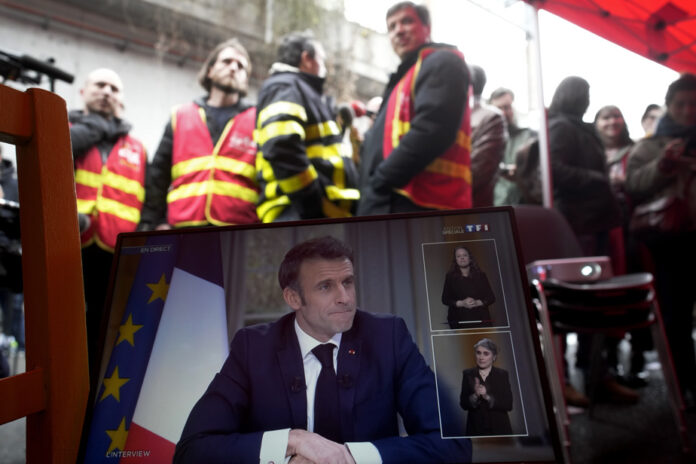Right in his boots, the President of the French Republic fully assumes his pension reform. The country is not taking off…
He had been very discreet so far – too much for some. But Emmanuel Macron finally came out of his silence on Wednesday, after weeks of social tensions in France.
Interviewed on the 1 p.m. television news, the President of the Republic was trying to put out the fire, a week after the disputed adoption of his pension reform. But his intervention was above all distinguished by a speech of firmness which is not likely to appease the discontent, while new mobilizations are announced for the days to come.
“This reform is not a pleasure, it’s not a luxury, it’s a necessity,” Macron commented, invoking the defense of “the general interest” in the face of the financial deterioration of pension funds. and the aging of the population.
Saying he “endorsed the unpopularity” of the reform, the Head of State took the opportunity to renew his confidence in Prime Minister Elisabeth Borne, criticized for having passed the law by force, by triggering the famous “49.3”, article of the Constitution allowing the adoption of texts without a parliamentary majority.
France is one of the Western countries where the legal retirement age is the lowest. The reform, which Macron says he wants to apply “before the end of the year”, “to get things back in place”, foresees that this age will be increased from 62 to 64 years old. A decision strongly contested by the unions and the entire French population, which says it is against 65% or 70%, according to the polls.
Since January, the French have taken to the streets eight times to protest, and a ninth day of demonstration is scheduled for Thursday.
For Bruno Cautrès, researcher at the Center for Political Research at Sciences Po (CEVIPOF), it is not Wednesday’s interview that will calm things down. The political scientist believes that the president has missed a great opportunity to to mend his ways and judged his intervention to be “not terrible”.
It remains to be seen whether the protest movement will experience a burst, in the wake of this television appearance, which does not seem to have convinced.
Some are already brandishing the specter of yellow vests, while the unions are calling for increased pressure against the bill, currently under consideration by the Constitutional Council (which should – or not – give it its approval).
Rallies are planned for Thursday across the country, affecting transport, refineries and oil depots, the education sector and garbage collectors, who want to continue their strike until Monday. There are fears of slippage, as violent demonstrations multiply, excesses to which the president has promised to “react”.
“The most likely is that there will be slow motions, strikes, a number of coups, even the use of violence. It is a possible way out of the conflict through radicalization and marginalization,” explains Olivier Ihl, professor of politics at the University of Grenoble.
Reacting to the presidential interview, the opposition did not fail to denounce “the contempt” (Marine Le Pen, Rassemblement national) and “the arrogance” of a president who “lives outside of all reality” (Jean -Luc Mélenchon, La France insoumise), the leader of the Socialist Party, Olivier Faure, even accusing him of having put “more explosives on an already lit inferno”.
“It is their role to dramatize. They are playing their part,” tempers Olivier Ihl, who prefers to put things into perspective.
The expert reports that the 49.3 has been used 100 times since the establishment of the Fifth Republic in 1958. “It is not an exceptional instrument. He recalls that pension reforms come up regularly, that “all are difficult to pass”, and that the current mobilizations are not greater in number than those of 1995.
In this sense, he hesitates to speak of a “political crisis” and does not rule out the possibility that the river will return to its bed.
Because if a majority of French people reject the reform, there is in the country “a form of resignation” which could lead in the medium term to a gradual reduction in mobilization. This does not exclude a more difficult sequence for the president “who has cut himself off a bit from the population”, and a backlash at the polls during the next European elections, scheduled in a year…


















